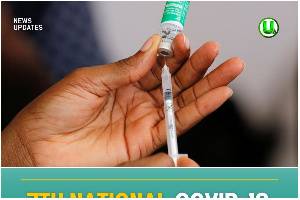Introduction
As the world continues to grapple with the unprecedented challenges posed by the COVID-19 pandemic, Ghana takes another significant stride in its battle against the virus. The country is set to embark on its 7th national COVID-19 vaccination exercise, aiming to accelerate immunization efforts and protect its citizens. This comprehensive analysis delves into the significance of the upcoming vaccination campaign, its key objectives, and the collective determination of the nation to combat the pandemic.
The Need for Continued Vaccination Efforts
Since the onset of the COVID-19 pandemic, vaccination has emerged as the most potent tool in the fight against the virus. Vaccination campaigns have been instrumental in reducing infection rates, hospitalizations, and mortality, safeguarding both individuals and communities. As new variants of the virus continue to emerge, the need for continued vaccination efforts remains crucial in building herd immunity and curbing the spread of the virus.
The 7th National COVID-19 Vaccination Exercise
On July 19, Ghana is set to commence its 7th national COVID-19 vaccination exercise, marking a significant milestone in the country's response to the pandemic. The campaign is a testament to the government's commitment to safeguarding public health and reviving socio-economic activities severely impacted by the virus.
Key Objectives of the Vaccination Exercise
The primary objectives of the 7th national COVID-19 vaccination exercise are multifaceted:
Expanding Vaccine Coverage: The campaign aims to increase vaccination coverage across the country, reaching a broader segment of the population. By making vaccines accessible to more citizens, Ghana seeks to strengthen its defense against the virus.
Immunizing Priority Groups: The exercise prioritizes vulnerable groups, including healthcare workers, the elderly, and individuals with underlying health conditions. Immunizing these groups is vital in reducing severe cases and fatalities.
Addressing Vaccine Hesitancy: The vaccination exercise also seeks to address vaccine hesitancy by promoting public awareness and education about the safety and efficacy of COVID-19 vaccines. Building trust in vaccines is essential to achieve widespread acceptance and participation.
Mitigating the Impact of New Variants: As new variants of the virus continue to emerge, the vaccination exercise serves as a proactive measure to mitigate their impact. Vaccination can reduce the severity of infections and prevent further mutations of the virus.
Boosting Socio-Economic Recovery: Widespread vaccination plays a pivotal role in rejuvenating economic activities. A vaccinated population can resume work and daily life with greater confidence, contributing to a quicker socio-economic recovery.
The Role of Healthcare Workers and Public Awareness
Healthcare workers play a pivotal role in the success of the vaccination exercise. Their dedication and commitment to administering vaccines efficiently and accurately are essential in achieving the campaign's objectives. Additionally, healthcare workers serve as trusted sources of information, addressing concerns and questions raised by the public, further supporting vaccine acceptance.
Public awareness campaigns play a crucial role in dispelling myths and misinformation surrounding vaccines. Engaging communities through various channels, such as media, social platforms, and community outreach programs, can empower citizens with accurate information about vaccines' safety and benefits.
Government Support and International Cooperation
The success of the 7th national COVID-19 vaccination exercise hinges on strong governmental support and effective coordination. The government's commitment to procuring adequate vaccine doses and ensuring their equitable distribution across the nation is vital in achieving universal vaccination coverage.
Moreover, international cooperation and partnerships are instrumental in enhancing Ghana's vaccine procurement efforts. Collaboration with international organizations and vaccine manufacturers helps secure sufficient doses to meet the country's needs.
Overcoming Challenges
While the vaccination exercise brings renewed hope, it also faces certain challenges. Addressing issues such as vaccine supply constraints, logistical hurdles, and vaccine hesitancy will require collective efforts from the government, healthcare workers, and the public.
As the 7th national COVID-19 vaccination exercise begins, Ghana embraces a critical phase in its journey to a safer future. The campaign not only marks a determined effort to protect the nation's citizens from the virus but also symbolizes the resilience and unity of the Ghanaian people in the face of adversity.
Expanding Vaccine Coverage: Reaching Every Corner
A key focus of the vaccination exercise is to expand vaccine coverage to reach every corner of the country. Ghana aims to ensure that vaccines are accessible to all citizens, regardless of their geographical location or socio-economic status. By setting up vaccination centers in both urban and rural areas, the government strives to create an inclusive immunization campaign that leaves no one behind.
Immunizing Priority Groups: Protecting the Most Vulnerable
Recognizing the importance of safeguarding vulnerable groups, the campaign prioritizes healthcare workers, the elderly, and individuals with underlying health conditions. Vaccinating frontline healthcare workers is essential in preserving the healthcare system's integrity and ensuring their continued ability to care for patients. Immunizing the elderly and those with underlying health conditions reduces the burden of severe cases and hospitalizations, safeguarding lives.
Tackling Vaccine Hesitancy: Building Trust through Awareness
Vaccine hesitancy remains a significant challenge in vaccination efforts. To address this, the government has launched comprehensive public awareness campaigns that emphasize the safety and efficacy of COVID-19 vaccines. Engaging with communities through various platforms, these campaigns aim to dispel myths and misinformation, building public trust in vaccines and encouraging participation in the vaccination exercise.
Mitigating the Impact of New Variants: Staying One Step Ahead
As the virus continues to evolve, the vaccination exercise serves as a proactive measure to mitigate the impact of new variants. Widespread vaccination not only reduces the severity of infections but also plays a crucial role in minimizing the opportunities for the virus to mutate further. By staying one step ahead through vaccination, Ghana seeks to stay resilient in the face of emerging challenges.
Boosting Socio-Economic Recovery: A Path Towards Normalcy
The vaccination exercise is not solely about public health; it also holds the key to Ghana's socio-economic recovery. With a vaccinated population, businesses can reopen, and economic activities can resume with greater confidence. A path towards normalcy becomes clearer as more people are protected against the virus, fostering economic growth and stability.
The Role of Healthcare Workers: Guardians of Health
Healthcare workers stand at the forefront of the vaccination campaign, tirelessly working to administer vaccines efficiently and accurately. Their dedication and expertise are invaluable in ensuring the success of the exercise. Moreover, as trusted sources of information, healthcare workers play a vital role in addressing vaccine-related concerns and encouraging vaccine acceptance within the communities they serve.
Government Leadership and International Collaboration: The Power of Unity
The success of the vaccination exercise is a testament to the strong leadership and commitment of the Ghanaian government. From procuring vaccine doses to overseeing their equitable distribution, the government plays a central role in the campaign's effectiveness.
International collaboration and partnerships also play a pivotal role in strengthening Ghana's vaccination efforts. By working closely with international organizations and vaccine manufacturers, Ghana can secure the necessary doses to achieve its vaccination targets.
Overcoming Challenges: Unwavering Determination
While the vaccination exercise presents numerous opportunities, it also comes with challenges. The government and healthcare workers must remain vigilant in addressing vaccine supply constraints and overcoming logistical hurdles to ensure a seamless vaccination process. Additionally, fostering a culture of vaccine acceptance and combating vaccine hesitancy require sustained efforts and community engagement.
Conclusion: A Collective Triumph
As the 7th national COVID-19 vaccination exercise commences, Ghana embarks on a collective triumph against the pandemic. The nation's unwavering determination to protect its citizens and rebuild its socio-economic fabric is evident in this ambitious initiative.
Through expanding vaccine coverage, prioritizing vulnerable groups, building public trust, and collaborating on a global scale, Ghana sets a shining example of unity and resilience in the face of a common adversary.
With each vaccine administered, hope is rekindled, and the promise of a safer, healthier future draws nearer. As the vaccination campaign progresses, Ghana stands poised to emerge stronger, better prepared, and more united in its pursuit of a brighter tomorrow for all its citizens.



No comments yet
Be the first to share your thoughts!